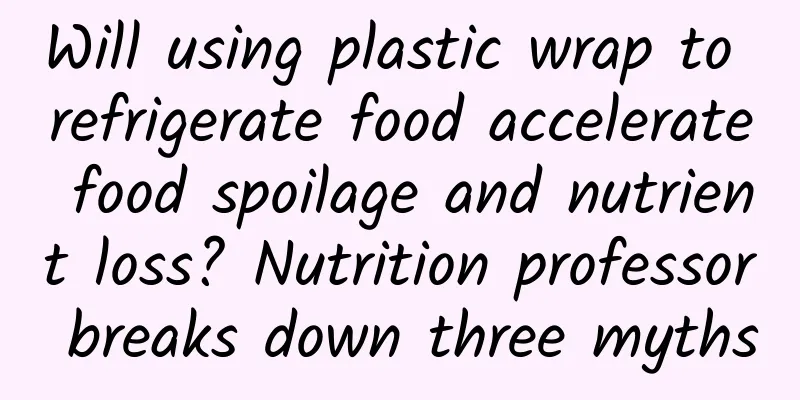Will using plastic wrap to refrigerate food accelerate food spoilage and nutrient loss? Nutrition professor breaks down three myths

|
When we accidentally prepare too much food and cannot finish it, many people are accustomed to wrapping it in plastic wrap and storing it in the refrigerator. However, there is a rumor on the Internet: "Some foods that are refrigerated after using plastic wrap will encourage bacterial growth, accelerate food spoilage or nutrient loss." There are also concerns that "using plastic wrap may cause people to consume large amounts of plasticizers?" So, should we use plastic wrap on food before putting it in the refrigerator? Let’s hear what the experts say! Myth 1: Sliced fruits are more likely to spoil when wrapped in plastic wrap?Eating watermelon in summer is the right time to cool off, but someone in mainland China once covered a cut watermelon with plastic wrap and put it in the refrigerator. After a while, they took it out and found that there were more bacteria and microorganisms on the surface of the watermelon than the watermelon that was not preserved with plastic wrap. When this news came out, many people were scared and started to wonder if their usual method of preserving food was wrong? Eating watermelon in summer is the right time to cool off, but someone in mainland China once covered a cut watermelon with plastic wrap and put it in the refrigerator. After a while, they took it out and found that there were more bacteria and microorganisms on the surface of the watermelon than the watermelon that was not preserved with plastic wrap. In this regard, Professor Wang Jinkun, a fellow of the International Food Technology Alliance and the International School of Nutritional Medicine, said that the growth of bacteria depends on suitable temperatures, and refrigerator temperatures below 8°C and freezing temperatures below minus 18°C can help inhibit the growth rate of bacteria and achieve the function of preserving food. As for why watermelons stored with plastic wrap are more likely to spoil than those stored without plastic wrap, the reason should be that the watermelon comes into contact with bacteria on the knife or utensils during the handling process, or that the plastic wrap is damaged and cannot completely isolate foreign bacteria, rather than a problem with the plastic wrap itself. Myth 2: When some foods are wrapped in plastic wrap and placed in the refrigerator, nutrients are lost faster?Some people say: "Before putting fresh vegetables such as leeks, radishes, and cucumbers in the refrigerator, it is best not to use plastic wrap to avoid losing vitamins faster." However, Professor Wang Jinkun said that the key to how fast food loses nutrients is "cutting". Once food goes through the processes of cutting and washing, the nutrients come into contact with oxygen in the air and are easily oxidized and lost, and the freshness will also decrease rapidly. But before the food is processed, whether it is wrapped in plastic wrap or not, the rate of nutrient loss is almost the same. Myth 3: Using plastic wrap may cause people to ingest large amounts of plasticizers?Professor Wang Jinkun pointed out that the cling films commonly used in people's homes are roughly of two types: PE (polyethylene terephthalate) and PVC (polyethylene chloride). The former is not heat-resistant and has low toxicity, while the latter is more heat-resistant but highly toxic. In principle, if used normally at low or room temperature, even if ordinary dishes are reheated, the polyethylene monomer and polyethylene chloride monomer in the plastic wrap will not be released, so as not to contaminate food and cause harm to the human body. However, if the plastic wrap is damaged and cooked from raw to well-done or microwaved together with the food, the monomers and toxins inside may flow into the food and be ingested along with the food. In principle, if used normally at low or room temperature, even if ordinary dishes are reheated, the polyethylene monomer and polyethylene chloride monomer in the plastic wrap will not be released, so as not to contaminate food and cause harm to the human body. As for plasticizer, it is one of the raw materials for making plastic wrap and helps with shaping. Under normal use, without overheating and without damage, the impact on human health is not significant and the public does not need to panic. However, Professor Wang Jinkun also suggested that people should try not to handle, cut or wash the food before putting it in the refrigerator; wrap the food in bowls and other containers before using plastic wrap, and avoid letting the plastic wrap come into contact with the food or juice from the dish when wrapping, so as to prevent the organic acids and fats in the food from dissolving in the monomer and contaminating the food. In addition, the refrigerator is not a universal food preservation box. Even with the help of plastic wrap, food can only be kept fresh for 2 days. |
Recommend
What are uterine fibroids? What are the common causes of uterine fibroids?
In recent years, the incidence of uterine fibroid...
How to have a miscarriage at four months
Abortion in the fourth month of pregnancy cannot ...
Symptoms of cervical adhesion after painless abortion
If cervical adhesions occur after painless aborti...
Three common misunderstandings about the treatment of cervical cancer Six traditional Chinese medicine prescriptions for cervical cancer
In recent years, more and more women have been su...
What are the signs of uterine fibroids growing? What will happen if uterine fibroids grow?
What are the symptoms of uterine fibroids growing...
What symptoms of cervical hypertrophy should female patients not ignore
Women of childbearing age are prone to various sy...
What are the specific hazards of ovarian cysts?
Early onset ovarian cyst is a common disease. If ...
Research progress on the causes of congenital absence of vagina
Congenital absence of vagina is a female disease ...
Can I get pregnant if I have chronic cervicitis and cervical hypertrophy?
Cervical hypertrophy caused by chronic cervicitis...
Women should always be on guard against the causes of pelvic inflammatory disease
Pelvic inflammatory disease is also a very common...
What should I pay attention to in my diet for cervical warts?
For most patients with cervical warts, they are m...
Antioxidant power competition! Top 5 must-eat fruits and vegetables in autumn and winter to help you stay away from diseases!
"Ha-chiu!" The weather changes dramatic...
What should I do if I feel greedy or hungry at night? 6 healthy snacks to increase satiety
I have eaten dinner but I still feel hungry and w...
Can drinking coffee help you lose weight? Wrong! It’s a cheating step to achieve good sports results!
I believe that many people always have a cup of c...
What should I pay attention to when eating if I am born without vagina?
What should people with congenital absence of vag...









